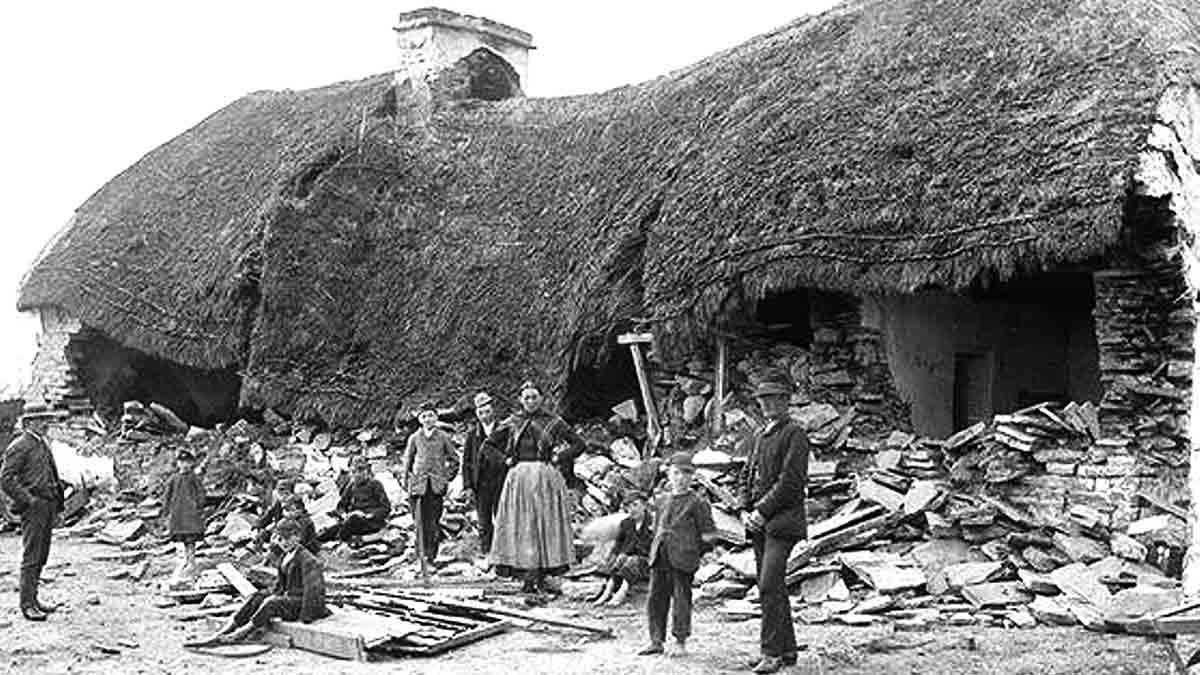BY JOHN FITZGERALD
PART TWO
Wellesley Bowes Prendergast of Listerlin was a delebrated horse deal and winner of prizes at agricultural shows, but in his treatment of tenants in the townland of Listerlin, he showed his dark side.
In December 1862, he descended like the wrath of Heaven on 36 families who dwelt in cabins spread out across a field called Garrai-na-Stra. These people had entered into a leasing arrangement with him known as “tenant at will.”
This one-sided contract allowed the landlord to evict them at any time of his choosing. A “Notice of Distraint” entitled Prendergast to seize their possessions in lieu of rent if they failed to pay up. So he held all the cards.
On that bleak December day, the Sheriff, Chief Inspector Bodkin, and a strong force of armed militia accompanied him to Garrai-na-Stra. One by one, the families were evicted from their cabins.
The soldiers helped the crowbar men to eject the tenants, inflicting injuries in the process and creating scenes of almost unbearable suffering and trauma. As the militia followed his instructions, the landlord strutted to and fro amidst the wrecked homes on his prize stallion. He lashed out with his whip at tenants who seemed reluctant to move away from their stricken abodes.
Before the empty cabins were torched, Prendergast ordered all furniture to be removed. He had a use for it; he informed the evicted families that eyed him with a mixture of fear and searing hatred: “It’ll fetch a good price for firewood on the quays of New Ross.”
Many of the evicted tenants, including children, died of hypothermia in the frost and snow. Some managed to find shelter; but the remainder sought refuge in Ross Workhouse…It was that or a lingering demise.
Prendergast remained a hate figure in Listerlin for decades after his death. Thoughts and acts of vengeance overshadowed his funeral. Locals gathered to block the passage of the cortege, which was flanked by riders of a dozen or more prestigious foxhunts, on its journey to the church at Mullinarrigle.
The gates leading into the church were blocked. After a standoff lasting several hours between mourners and local protesters, his body was taken instead to the Old Cemetery at Listerlin. Hunting horns were blown at the graveside and a Master of Foxhounds read the Ode to John Peel. His upper-crust friends had not deserted him.
People power tackles the bullies…
Not all evictions were as brutally one-sided as the ones at Brownsford and Listerlin. In 1885 tenants and other locals in Ballyfacey banded together and pledged to resist the crowbar gangs. On the morning of August 27th, more than 100 constables gathered in Mullinavat under the joint command of RIC divisional inspectors O’ Hara of Thomastown, Byrne of Callan, and O’ Brien of Kilkenny.
The large force was to accompany crowbar men to Ballyfacey to evict tenants on the instructions of landlords Tighe and Crawford. Weeks earlier, a number of evictions had taken place in the locality.
But across South Kilkenny hundreds of men and women decided to resist the bullies this time around. The chapel bells of Mullinavat rang out a warning that the crowbar men were on the way to Ballyfacey. The call to resistance was echoed by the bells of churches in Glenmore, Ballyhale, Rosbercon, Thomastown, Bigwood, Tullagher, and Mullinarrigle.
A party of men on horseback raced from Mullinavat to alert the Ballyfacey community to what faced the hapless tenants.
The police contingent appeared on the fringes of Ballyfacey. Facing the constables and crowbar men were over a thousand determined locals. People from all walks of life stood shoulder to shoulder…to show solidarity with the families about to be evicted.
They held pitchforks, shovels, sprongs, and ash plants, and had a plentiful supply of stones. The police, armed with rifles and batons, moved cautiously onto a lane in the village towards the phalanx of protesters. A barrage of stones and other missiles greeted their arrival.
A Resident Magistrate then read the Riot Act and the police were authorised to remove the snap caps from their rifles. They were prepared to open fire if necessary. The PP of Mullinavat, Fr. Neary, intervened in an effort to prevent bloodshed. After some heated discussions between the priest and the landlords’ men, the planned evictions were called off, allegedly for technical reasons.
The agent responsible for enforcing the evictions had forgotten or misplaced writs authorising the legal expulsion of the tenants from their homes. Or so he claimed. Tension eased, and the police returned to Mullinavat.
People Power had triumphed at Ballyfacey.




















